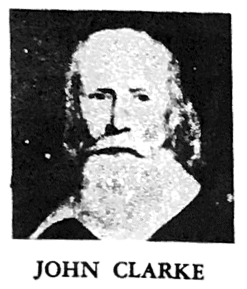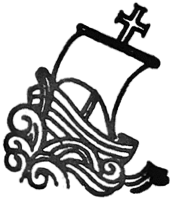 Iris' Archives, February 2018
Iris' Archives, February 2018
by Iris Holt, Church Warden Emerita
John Clarke
CLARKE, JOHN (klark) 1609-1676 English physician and preacher who led in the founding of the Rhode Island colony, as at first distinct from the settlement at Providence. He secured from King Charles II the Rhode Island charter of 1663 which guaranteed civil and religious liberty. Has been called “the most important Baptist of the 17th Century".
The Ship
The Church sails unharmed through all perils. The
word, "Nave," comes from the Latin word for “ship."
 Phillips Brooks, 1835-1893
Phillips Brooks, 1835-1893
Rock of Ages
Before we write of Toplady's masterpiece, 'Rock of Ages', we will give some account of his life. He was born at Farnham in Surrey in 1740. His father, a major in the army, died of yellow fever at the siege of Cartagena in South America, a few months after the birth of his son. Toplady retained a deep and lasting sense of indebtedness to his mother who showed him much love and planned his education wisely. He went first to Westminster School, starting there as William Cowper would be leaving. Later, when providential circumstances took his mother to Ireland, he entered Trinity College, Dublin, graduating in 1760.
While I draw this fleeting breath,
When my eyelids close in death,
When I soar through tracts unknown,
See Thee on Thy judgment throne,
Rock of Ages, cleft for me,
Let me hide myself in Thee.
The hymn 'Rock of Ages' is based on the marginal reading of Isaiah 26:4 —'For in the Lord Jehovah is the Rock of Ages'. The thought of the Lord as a Rock had fascinated Toplady as far back as his Trinity College days. In the neighbourhood of Blagdon, where To p l a d y first ministered, there is a walk to Burrington Gorge, one of the awe-inspiring ravines for which the Mendips are famous. Near the ravine there is a huge cleft rock, known locally as 'The Rock of Ages'. The story runs that one day Toplady was overtaken by a storm and that, while sheltering in this cleft rock, his imagination began to work and expressed itself some years later in the hymn which will always be associated with his name. It is unlikely that the story is true, but it is certain that thoughts of Christ as a cleft and sheltering Rock had taken hold of Toplady's mind. Years ago the writer herself stood in this cleft rock, feeling very small as she looked up to its summit which is as high as the roof of a house. The cleft rock is a striking illustration of the truth expressed in the hymn, even though it may not have provided the inspiration for it.
In an unpublished sermon of Toplady's there is another interesting allusion to the Rock of Ages. Toplady says that the Lord is a Rock in three ways, as a Foundation to support (Matt. 16:18 and 7:25), a Shelter to screen (Isaiah 32:2), and a Fortress to protect (Song of Solomon 2:14). In another unpublished manuscript Toplady says, 'The finest sight in the world is a stately ship, lying at anchor by moonlight in the mouth of the harbour, waiting for high water to carry it into the haven. Such is the dying Christian at anchor, safely reposed in Christ, the Rock of Ages.’ The complete hymn was printed in the Gospel Magazine of 1776 when Toplady was for a short time its editor.
Toplady’s many works in poetry and prose have all been surpassed by this one hymn. How it would have rejoiced his heart to know that Christians all over the world sing:
Not the labours of my hands
Can fulfil Thy law's demands:
Could my zeal no respite know,
Could my tears for ever flow,
All for sin could not atone:
Thou must save and Thou alone.
It has been said that this one hymn has given him a deeper place in millions of human hearts, from generation to generation, than almost any other hymn-writer of our country. J. C. Ryle, the godly bishop of Liverpool in the late 14th century, says, 'Of all English hymn-writers none perhaps has succeeded so thoroughly in combining truth, poetry, life, warmth, fire, depth, solemnity and unction as Toplady has.’
The Archbishop and the egg
The actual length of certain hymns can have a surprising relevance in itself. Archbishop Temple, in spite of his own shortcomings, greatly admired those who would burst into impromptu singing just for the fun of it. He once commended the cook of the household where he was staying for her joyous rendering of `Nearer My God to Thee', which he heard as he was going down to breakfast. Flattered, though a little flustered, she thanked him but felt obliged to explain, `That's the hymn I always boil the eggs to, my Lord. Three verses for soft and five for hard.’
Iris Holt, 31/01/2018